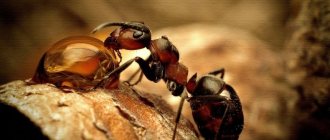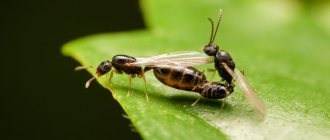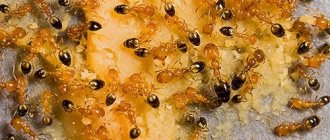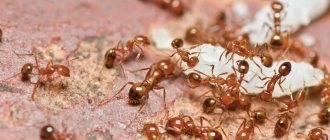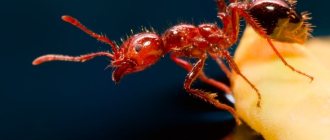An ant colony lives for several years, and how ants overwinter may be of interest not only to entomologists and nature lovers. Often, neighboring a person, bringing great benefit in the garden and annoying in a home or greenhouse, these hardworking creatures attract attention. And you shouldn’t hope that they will freeze in winter. With the onset of the first spring days, it turns out that they were just sleeping and waiting for warmth.
How do ants prepare for winter?
To ensure sufficient nutrition and a quiet winter, they perform a large amount of work. First of all, the ants prepare a sufficient amount of food; for this, workers collect caterpillars, beetles, bedbugs and other garden insects that live in their area. A certain part is used to feed the larvae, and the rest is stored in special chambers suitable for wintering. This way they won’t have to leave their “rooms” and let the cold into the anthill. The harvested diet also includes various parts of plants, their fruits and seeds. In addition, they bring live aphids into underground rooms, and the ants happily eat their secretions.
Preparation is not complete without insulating the home. Working ants build a kind of hill (dome) over their homes, which provides warmth during harsh weather conditions. In red forest ants, such a mound reaches a width of more than 1 meter and a height of 50 cm. This heap contains passages and chambers. The collected loose material prevents the cold from penetrating into the underground rooms. They also prepare compartments for wintering, insulating them and storing food.
With the onset of late autumn, little workaholics clog all the exits from their homes. The materials used are earth, clay, dry leaves, etc. In this way they ensure maximum warmth for their home.
If the upper layers freeze, the owners move supplies deeper, where the cold cannot reach and spoil the food.
Every year, before the air temperature drops, they expand their home and strive to make it even deeper.
How ants winter. What do ants do in winter
The life of ants is studied by a separate branch of science - myrmecology. Scientists have carefully studied how ants overwinter in an anthill. It is curious that these insects survive winter in their own way. Some begin to prepare for the onset of cold weather with the arrival of spring, barely waking up from the previous cold, while others lead a carefree lifestyle all year round.
Preparing insects for winter
With the onset of cold weather, activity stops or changes slightly.
- In countries with warm climates, insects are active all year round and do not prepare for winter in any way. Representatives of this species are pharaoh ants, brought to our area from tropical countries. They live in a human home, where the same temperature is maintained all year round. This representative of ants cannot live in the wild and dies. Mostly home residents who do not know that it can be cold outside.
- In countries where the warm season lasts only a couple of months, insects spend most of their lives in the anthill. Supplies are made at the first opportunity, and the larvae are forced to spend the winter in a supercooled state.
- • Of particular interest is the process of preparation for winter in black ants. It is these representatives of the family that annoy people the most, they settle in the garden, in the garden, and crawl into the house. In behavior they are similar to forest ones.
Scientists have long been interested in how ants of species common in our area prepare for winter. They became known.
Wintering place
Where ants spend the winter depends on their species. In the wild or in a human home. The latter do not change the direction of their activities in any way. In their natural environment, insects are forced to take care of successful wintering from mid-summer. They wait out the winter frosts in the anthill, equipping it properly.
The working part of the family carries food supplies into the anthill in the form of seeds, grains, plants, etc. They set up special chambers and create deep passages. They try to put more soil on the anthill, leaves, twigs to make it warmer. With the onset of cold weather, the whole family climbs into the house and the entrances are tightly closed.
Wintering process
As the temperature drops, insects descend into the lower chambers of the anthill. If the winter is not too severe, life in the anthill does not stop. In winter, adult ants take care of larvae, eggs, and the young generation that did not have time to grow up before the cold weather. Such care allows all members of the large ant community to successfully overwinter.
Ant queen
Ants live as a family. This is a highly organized society, consisting of various castes: workers, soldiers, other specialized groups and, of course, queens (reproductive females), of which there may be one or several in one family. In this regard, in ant society there is a division of labor. And it is this fact that has long interested researchers, as it suggests an association with the organization of life in human society.
By the way, many ant families exist for quite a long time: the queen (queen) - up to 20 years, workers - from 1 to 3 years, males - only a few weeks. Many people want to find out what each member of the ant family does? The queen (queen) lays eggs, sometimes she leaves the nest and collects food (this depends on the type of ants).
Males (as in the entire animal world, and there is no exception here) fertilize young females and die after mating. Well, the fate of the males is sad... The third category of members of the ant family is the most numerous and effective - workers. These are mainly females who cannot bear offspring. Since they do all the housework, they differ in size, sensitivity of their sensory organs, and activity.
The queen sometimes leaves the nest when laying eggs.
Their sphere of activity is varied: weaver ants, there are nannies (they look after young individuals), a significant part of the family is engaged in nest construction, forager ants are engaged in prey, there are cleaners, and stock keepers. An ant family can number hundreds of thousands of individuals, but at the same time they all work as a single organism.
We invite you to familiarize yourself with: Raspberry variety Giant, characteristics of agricultural cultivation techniques
And this cannot be surprising. If you decide to find out how ants overwinter in an anthill, then first of all it should be noted that anthills in cold regions are underground, which allows insects to withstand the most unfavorable environmental conditions, including low temperatures. During this period, insects operate in “economy” mode, and the reserves that were collected in the summer are enough for the entire colony.
What does the queen ant look like? In most colonies, the individuals responsible for reproducing offspring are significantly larger in size than ordinary worker insects. The queen can be identified by the presence of wings, which she requires to search for new habitats. However, when moving into a colony, they may disappear. In this case, in the place where the cephalothorax passes into the abdomen, corresponding marks remain in the form of small tubercles.
Ants in the house in winter. What do ants that appear in your home mean - is it worth driving them out?
The sudden appearance of ants in the house is a sign with the help of which nature gives us various signs. If you find out how such a sign of fate is deciphered, you can derive many benefits from it: predict future events, influence the surrounding reality and change your destiny. Nature, especially these days, does not come into contact with human life and his home, just like that.
The main meaning of the sign
Currently, many people equate ants with other insect pests and parasites, such as cockroaches or bedbugs. Residents of houses, having discovered these creatures in their homes, run for insecticides in order to get them out as soon as possible. However, since ancient times, ants in the house were considered a good omen, and our ancestors did not drive these creatures out of their houses or yards.
Ants are family insects. They have their own hierarchy, a clear division of all roles and responsibilities. They closely monitor their offspring, protect them and protect them from dangers. Based on this, the interpretation of the sign is that ants in the house contribute to the establishment of family relationships. Soon the spouses will stop quarreling and, if there has been any, infidelity will stop.
Also, according to ancient beliefs, if ants are actively running around in your home, in the near future you will experience an improvement in your material well-being, the source of which may be very unexpected.
It is possible to lose the monthly income of all working family members or just one person. It could also be receiving an inheritance or winning the lottery. Moreover, there is a relationship between the number of ants and the amount of wealth awaiting in the future.
An ancient belief
In the old days, everything was completely different - people were not embarrassed by small insects running around their homes. It was the other way around - the residents of the house could be seriously concerned about the absence of ants. This attitude was due to everyday circumstances.
The floors in the huts were either earthen or wooden, but they could not be called dense. Therefore, there were no obstacles for the forest orderlies to prevent them from entering human habitations.
The presence of ants was perceived as a symbol of the well-being and prosperity of the family. It was believed that ants are not able to take root only in a house where negative energy reigns. If disagreements arose between family members, household members argued or were offended at each other, the ants left this unfavorable place.
In the old days, no one thought about driving out ants from the hut, since this action entailed scaring away good luck and wealth. These days you can look at this in different ways. If ants do not interfere with household members in any way, you can simply ignore them, since they do not stay in a person’s home for long. However, if they cause discomfort, they are easy to remove, and you should not believe in bad things.
Other signs about ants in your home
There are several other beliefs about this phenomenon. It is worth familiarizing yourself with them to understand how best to behave if you see ants in your home.
- If there are ants in the house, you can’t swear or make trouble - this can bring trouble into the house and scare away good luck. It is undesirable to make a scene in any case - even in the absence of these insects. However, their appearance and belief in this sign may teach household members to keep their emotions under control.
- A favorable sign is ants that have settled not in the home itself, but near the threshold. This phenomenon portends good news and pleasant guests. Do not crush them with your feet under any circumstances. There is no point in kicking them out, since in the fall or much earlier they will leave on their own.
- An equally favorable omen is an anthill that appears in the middle of a garden or yard. This sign promises the owners a quiet life in complete prosperity and prosperity. According to popular belief, an anthill is a powerful energy talisman that protects the site and the house from evil, negative energy and other unpleasant phenomena, so you should not smash, destroy or break it.
- According to another legend, ants bite only unkind people who commit evil deeds, or those who lead a vicious life. Therefore, if your conscience is clear, you should not be afraid of this. However, if you were nevertheless bitten by one of the forest orderlies, you should think about your daily behavior.
Where do ants spend the winter?
Insects spend the winter period in the same anthill as the rest of the time. With the onset of cold weather, they move to deeper chambers. The temperature in them is higher than in the upper ones. Usually it is zero degrees. Stable temperatures allow them to overwinter without losses, continuing their measured lifestyle. Pre-sealed passages do not allow cold air to pass through. If the first layer gets wet, the little workers carry food supplies deeper and deeper. In countries with warm winters, during the thaw period they can come to the surface in search of food.
The reason for the appearance of ants in an apartment in winter
With the onset of cold weather, ants can sometimes suddenly appear in apartments. Following instinct, they move to where it is warm and there is food.
Forest and garden ants spend the winter in their habitats. Even if they are accidentally brought into an apartment, they will not live there. But heat-loving insects, brought to us from the southern regions, with the arrival of winter move from basements, garbage chutes, shops and cafes attached to the house into living quarters.
To prevent such migration, it is necessary to monitor the cleanliness of the apartment and regularly disinfect technical rooms and waste containers.
Bringing out of hibernation
It is necessary to remove the ants slowly so as not to give them hypothermic shock. To do this, gradually raise the temperature over several days, moving the insects to an increasingly warmer place, and to restore strength, prepare protein food for them in advance; a crushed insect is best.
If everything was done correctly, then after a couple of weeks the queen will begin to lay eggs again, which means the wintering was successful. Beginners are still recommended to purchase ants that do without wintering, the types of which are listed in the table at the beginning of the article.
Do ants sleep, die or work in winter?
As the weather gets colder, the colony slows down the pace of its usual existence. Despite this, hard workers do not stop fulfilling their duties. The uterus gives birth to offspring much less often or completely stops breeding them. Larvae that do not have time to transform into adults slow down their development. In winter, workers transfer the queen to a warm chamber and feed her with protein-rich foods. When consuming enough protein, she begins to lay trophic eggs. This type of egg does not give birth to larvae; they act as food for the queen.
Species of ants living in mild climates can come to the surface at above-zero temperatures, continue preparing supplies and breeding new larvae. They navigate by rising temperatures, warming up their home and shortening or increasing daylight hours.
The larvae, living at high altitudes in a state of torpor, can survive two winters and then grow into a large individual.
After workers have blocked all the entrances, a person cannot determine whether the ants are sleeping or not.
Features of survival in cold weather
Before the onset of the cold season, adult individuals carefully seal all external passages from the anthill advance using dry grass and earth. Passages are opened only for the time when food supplies need to be replenished. But this happens only when the ambient temperature rises.
If in winter the upper part of the anthill gets wet, a special detachment transfers food supplies to chambers that are located deeper. Ants overwinter in their insulated home until March-April . The main sign that insects are approaching the surface is the laying of eggs by the queen and the gradual resumption of activity. In the spring, the life activity of adult insects resumes completely.
Living in different regions and under different climatic conditions, all these insects overwinter in their own way. For example, polar species have to spend the winter from 7 to 9 months. They manage to feed their offspring during that short warm period of time when there is no snow. In their expansion to the north, insects are stopped only by the border, beyond which, even in summer, the soil does not warm up deeper than 30 cm.
For example:
- Kamchatkas make their homes on hummocks; the depth of their anthills ranges from 10 to 40 cm. The temperature of the ground in summer is very important to them for the normal development of the larvae.
- Ants living in hot regions of Central Asia and the Mediterranean overwinter for a maximum of 1 to 2 months.
- Ants living in Turkey do not winter every year. They hide for the winter only when severe weather conditions occur, which does not happen very often. But this type of insect still prepares for wintering every year, making food reserves, arranging homes and feeding larvae.
- The well-known pest of the pharaoh ant , or as it is also called - the house ant, never prepares for winter and does not go to bed. This is due to the fact that its homeland is the tropics, where there are no climate changes. He lives excellently in a person’s home and can die only when, by some accident, he remains on the street.
In winter, the larvae stop their development and do not pupate, the pupae stop metamorphosis, and the queens stop laying eggs. In preparation for winter, adult workers feed on aphid secretions. These secretions contain large amounts of sugar, which is converted into glycerol in the body. In winter, it makes up up to 30% of the insect’s body, which makes it possible to preserve itself and prevent it from freezing in severe frosts. For comfortable wintering, the temperature in the underground part of the anthill should not fall below -2 degrees.
Judging by the research of scientists, ants have no strict ban on leaving the anthill in winter. Insects simply move in those temperature zones where they will not freeze. But basically, this temperature is maintained only inside the nest. When the thaw comes, the anthill warms up, and the insects crawl to the outermost exits, and when the air temperature rises strongly, they open several exits and crawl to the surface. This often happens even in winter.
Neighbours
In addition to the ants themselves, aphids, beetles, moths, and also the larvae of these insects also live in their home nearby. They are useful for those who secrete a special nutritious and sweet-tasting enzyme that helps ants survive in the cold. Such neighbors themselves eat not only part of the ant reserves, but also their eggs. Many insects and beetles, hiding from severe frosts, find salvation in abandoned dwellings located on the surface of the soil.
Ants have a big sweet tooth. Sometimes it comes to the point that they carry entire colonies of aphids underground and continue to feast on the sweet secretion secreted. True, without fresh food, aphids die within a few weeks, but for some time the ants have the opportunity to taste the products of their vital activity.
In addition to aphids, other insects also inhabit anthills - beetles, moths and their larvae. They also secrete a sweet juice, and they themselves can feed on ant stores or even their eggs. As a result, they help each other survive in the cold season.
Briefly about the main thing
We found out what ants do in winter. If we are not talking about areas with extreme climates, insects continue to live in their usual mode, but less actively. In northern regions, ants and their larvae overwinter in a supercooled state.
We have found the answer to the question whether ants sleep in winter or not. It turns out that the majority of insects do not sleep. Only some species hibernate.
And one more thing - where are the ants in winter. The answer is quite simple - in your own house, but on the lower floors.
Tags: do, winter, ant, nature
About the author: admin4ik
« Previous entry
Setting up an anthill for wintering
Ants overwinter in the same anthills in which they live the rest of the time. Most often, chambers located deeper in the ground are used as wintering rooms, since they maintain a more stable temperature throughout the winter.
All entrances to the anthill for the winter are carefully sealed with earth and dry parts of plants so that cold air does not enter through them. In warm regions, during periods of thaw, individual entrances may become uncorked and insects run to the surface in search of food.
Some ants sleep in winter - this can be called a state of diapause, in which the functioning of the internal organs of insects is extremely reduced, but not stopped.
Other species remain active during the winter. As a rule, during this period they move little and eat little. But at the same time, if the larvae overwinter in the anthill, the adults continue to feed them. Such ants are actively preparing for winter and collecting larvae in chambers with an optimal microclimate.
The anthill in winter of those ants that do not hibernate is practically no different from its summer state. Inside it, only the dislocation of the insects themselves changes: ants live somewhat deeper in winter, away from the cold surface of the soil. Sometimes they even have to make special wintering chambers.
Due to constant temperature fluctuations on the surface, as well as due to the frequent getting wet of the top layer of the anthill, insects are forced to constantly move and transfer part of their supplies. That is why life in an anthill in winter does not stop for a moment.
Ants begin to prepare for winter even in the hottest months of summer, gradually equipping the internal chambers of the home and collecting food for the winter.
Judging by the researchers' data, ants do not have a strict taboo on leaving the nest in winter. They simply move within temperatures at which the insect does not freeze. In most cases, such temperatures are maintained only inside the anthill.
With the arrival of the spring thaw, the anthill heats up, and the ants can get to the very exits. At a certain air temperature, insects uncork separate entrances and emerge to the surface.
In addition to the owners of the anthill themselves, aphids, all kinds of beetles, moths and the larvae of the above insects also live in their neighborhood. They help ants survive in winter, since, for example, aphids secrete a sweet nutritious enzyme, which, as is already known, ants convert into glycerol.
These are such interesting hard-working ants, who try to make the most of all the opportunities that the environment gives them in order to continue to live and reproduce.
What do ants do in winter? Preparing for the arrival of cold weather is an extremely labor-intensive process for such insects. Most of their time is spent storing food in special pantries. Edible plant particles, various seeds, dried insects, etc. are brought here. As the ambient temperature decreases, all remaining larvae are fed.
Why don't ants freeze in winter?
These earthly inhabitants even live in the northern tundra, which is known for its cold air temperatures. In the Kamchatka and polar ants, the passages and “rooms” are located at a depth of 10-30 cm.
Ants living in the temperate zone build a “dome” over their homes to warm their chambers. If an individual rises to the first “floors”, it will immediately feel discomfort and cold and go back down.
They are allowed to survive by special sugary substances secreted by aphids. Sugar accumulates in the body, and then the substances in the body of the ant are converted into glycerol. Thanks to this, they can easily tolerate temperatures down to -50 degrees. Accordingly, they enter diapause. At first glance, the colony, along with the queen and larvae, appear to be dead, because they do not move or eat. The diapause period lasts until the temperature rises.
Beetles move in with them for the winter. The hosts feed on their sweet secretion, and the guests feed on prepared supplies.
Preparing for cold weather
In the life of an anthill, preparation for winter cold is the most important period. Since spring, all the efforts of the colony are concentrated on preparing resources for wintering and the appearance of young animals before the arrival of frost. It is reliably known that many ants do not go into suspended animation in winter, but lead an active lifestyle, although not the same as in the warm season. How they prepare for winter has been studied by both scientific myrmecologists and amateurs. The main stages of preparation for winter are:
- food preparation;
- insulation of the anthill.
When preparing food for food in winter, insects obtain and bring into their home dry fruits, seeds of various plants, as well as dried parts of the plants themselves. Insects drag the prepared provisions from one place to another all winter, which prevents it from deteriorating in conditions of high humidity, and the insects themselves do not die from hunger.
In winter, eggs laid in summer are also a good help. They are sterile (in other words, trophic) and serve as good feeding during the cold season.
The next step is preparing the winter home. The ants move to the lower floors of the anthill, which are located at a depth of 1.5 to 2 meters, where they are quite comfortable. Constant soil temperature at such a depth promotes wintering in fairly good conditions. To insulate the anthill, insects carry various debris and soil out of it to the surface even before the onset of cold weather. This is necessary in order to cover your home with a so-called fur coat. This is how insects prepare for winter.
Prevention
Preventive measures are necessary in order to consolidate the achieved effect and prevent further appearance of ants in the house. With their help, you can get rid of insects in your apartment for many years.
For prevention, the following rules must be observed:
- timely remove all leftovers from meals into a trash bin with a tight-fitting lid;
- do not keep large supplies of food in the house;
- Store cereals, flour, sugar and other products in glass jars closed with lids;
- periodically carry out wet cleaning of the premises and prevent the accumulation of trash and debris.
To repel insects, you can use fragrant herbs, aromatic oils and substances with a strong odor. For example, red ants do not like vinegar, ammonia and laundry soap. They also dislike the aroma of cloves and tobacco smoke.
After removing ants, various odors can be used for prevention. Natural herbs that insects do not like:
- garlic;
- sagebrush;
- geranium;
- mint;
- parsley;
- tomato tops.
After removing the ants, fresh plant branches can be laid out near the places where they appear. The disadvantage of this method is that the leaves quickly wither and the smell disappears.
Garlic contains a record amount of essential oils. It can be used to coat baseboards, cracks in the floor and between tiles. The smell will last a long time.
Ants can't stand the smell of garlic
Fresh lemon slices retain their scent longer than herbs. You need to cut the lemon and place the slices in places where arrogant pests are expected to appear.
We suggest you read: What hot peppers can be grown on the windowsill
Geranium can be grown on a window. It blooms beautifully, its smell calms the nervous system. The flower is among the record holders for purifying the air, especially from tobacco smoke. The leaves can be plucked periodically and coated with the exits from ant holes. The disadvantage of removing insects with herbs is that they must be constantly replaced with fresh ones and the ants gradually become accustomed to one smell. Plants need to be changed.
Essential oils retain their scent for a long time. It is enough to drop mint, lemon oil, garlic extract into the hole, the ants will not walk through that tunnel for a long time.
The pungent smell of essential oils will help get rid of insects
In nature, there is a smell that causes panic in ants. This is formic acid. It can be bought at a pharmacy, synthesized artificially. The substance got its name because it is secreted by ants. Insects transmit many signals to each other, producing different enzymes. Some mark the path.
If you buy a bottle of formic acid, the smell of which a person cannot smell, then just apply it to cotton pads and place it along the baseboards, not a single ant will crawl into the apartment. The leftovers can be placed in a cabinet in the kitchen, just do not close it tightly. Let the smell dissipate a little. For a couple of years or more, the apartment is protected from visiting ants.
How to get rid of ants in an apartment in winter
In winter, you can often see ants in an apartment, and their presence immediately becomes a big problem. They not only eat food products, preferring sweets, but also gnaw out homes for themselves in wood products.
Traps, adhesive tapes, and Velcro do not help in the fight against insects.
The most effective way is to find an anthill and use the following chemicals:
• “Cucaracha”; • “Xulat S25”; • “Fufanon-super”; • "Eslanadez".
These products are very effective against ants, but are toxic to both animals and people. Therefore, using them in residential areas is quite dangerous. You can spray them, for example, before leaving on vacation, and upon arrival, thoroughly wash the floors and wash fabric items. They should absolutely not be used in apartments where children live. In such cases, it is better to pay attention to traditional methods of exterminating ants in an apartment.
To kill ants in the house and especially in the kitchen, you can use folk remedies:
- 1. Chamomile officinalis. Sprinkle where insects appear.
- 2. Add sugar or honey to a container with water. Ants will get in there and drown.
- 3. Boric acid. Mix it with bait (sugar, honey, egg, potatoes, jam, meat) and place it in places where pests are concentrated.
- 4. Borax. Do the same.
- 5. Garlic, sunflower oil, lemon, parsley, clove spice, mint, wormwood. Spread or sprinkle on ant paths and areas where they gather.
How long does winter last and when does it end?
The duration of wintering depends on the climate where the ants live. Overwintering of different types of insects differs significantly. Species Camponotus sp. hibernates for 3-5 months, and Myrmica sp. only 1-2 months. Lasius (Niger) can do without it, but it is recommended to do it at least once every two years. Polar ants hibernate for 8-9 months a year, and in the remaining time they try to feed their future offspring. This is not always possible due to the short period of time without snow. Fortunately, in such extreme conditions, they successfully survive. Residents of warmer regions can winter only 2-3 of the frostiest months of the year. Residents of the southern climate are luckier. They very rarely fall into a state of sleep. The exception is the most severe times. Active individuals continue to instinctively prepare for winter and devote their time to collecting seeds and other food, digging new tunnels and do not forget about feeding the larvae.
Do ants sleep?
Previously it was believed that such insects never rest, being constantly on the move. However, recent research suggests the opposite. Trying to understand whether ants sleep, scientists grew a colony of insects in the laboratory. Observing the behavior of ants allowed them to identify several interesting facts, which will be discussed below.
Ordinary worker ants really spend all their time on everyday activities. However, even they, like all representatives of the animal world, need rest. Research results show that they spend about 3-4 hours sleeping per day. At the same time, the one-time duration of such rest is no more than 2 minutes.
Do queen ants sleep? According to observations, these individuals are also not averse to resting. Queen ants sleep in a colony much longer than worker ants. They can sleep intermittently up to 8 hours a day. Scientists have discovered an interesting pattern. If the antennae of the uterus are raised and the mouthparts are slightly open, then shallow sleep occurs. When the antennae are lowered and the mouth is closed, this indicates a more sound sleep.
We already know where goosebumps go to live when the cold weather sets in. Some adult individuals spend the winter in sleep, that is, in a state of diapause. At the same time, the work of all internal organs does not stop, but only decreases. Other types of insects are still active, but not as much as in the summer. In some insect species, only adult individuals spend the winter.
These are species that do not go into diapause. Larvae need protein food - for example, other arthropods, which adults are not able to get. By the onset of winter, the offspring from the eggs laid in the spring turn into adult ants that go to winter. And the queen lays eggs again in the spring, when the first protein food is already available.
Interesting facts from the life of ants are known. For example, in Kolyma, the minimum possible temperature for insects was once recorded - minus 58 degrees. What is surprising is that the larvae's metabolism did not stop. In this state, the ants practically lose their mobility. You can say that they are going to sleep.
Some species of ants sleep in winter, a period called “diapause.” At the same time, the internal organs of insects function, but at a slow pace.
The majority of ants do not sleep in cold weather. Their physical activity is decreasing, but work continues. One of the main tasks is feeding the larvae (for those species in which the emergence of adults before winter is not planned).
Depending on the region where they live, ants overwinter in different ways and at different times. The polar ant spends 8–9 months of the year overwintering. During the remaining warm months, the larvae do not have time to grow and overwinter even twice or three times. Nevertheless, the inhabitants of anthills tolerate the cold quite unproblematically.
In southern regions with a relatively warm climate, anthills remain closed for 2–3 months. And in regions with a transitional climate (Turkey, countries of Asia Minor), sometimes ants do not overwinter at all. But what’s remarkable is that they still prepare for the cold: they stockpile supplies for future use and raise a huge number of larvae.
So the answer to the question: do ants store supplies for the winter can be answered unequivocally - yes, and everywhere.
We suggest you read: What to do if you don’t have sunflower oil
Video at home Winter period for ants
In this video you will learn how these insects survive winter.
Those ants that do not hibernate move quite little and also rarely consume food. But when the larvae spend the winter in the home, the adults continue to actively feed them. These types of ants carefully prepare for the winter period, collecting larvae in special chambers where it is possible to create a comfortable microclimate.
To survive, working individuals have been preparing food supplies since the fall, which should be enough before the snow begins to melt. With the onset of cold weather, the workforce carries out home repairs in those places where it is necessary.
This video shows what happens to ants after winter sleep.
A little about hibernation
Some adult individuals spend the winter in hibernation - diapause . With it, the work of the insect’s internal organs does not stop, but only slows down. Other species are active all winter , although their vital activity is much lower than in summer.
There are also ants in which only adult insects hibernate. These are the species that do not hibernate. For example, larvae need protein food, which there is nowhere to get in winter. When cold weather arrives, adults hatch from eggs laid in the spring and overwinter. And in the spring, the queen lays eggs again, when protein food can already be found.
There is more than one interesting fact from the life of insects. For example, once in Kolyma in the recent past the lowest possible temperature for ants to survive was recorded -58 degrees. It is interesting that metabolism in the larvae’s body did not stop. In such conditions they are practically motionless.
The role of ants in nature
Despite the fact that ants are only concerned with finding food and establishing their own colonies, they bring a lot of benefits to ecosystems. Such forest workers not only loosen the soil, enriching it with oxygen and microelements, but also destroy a whole host of insects that harm vegetation. It is not for nothing that the trees and shrubs around the colonies look more “healthy”. After all, ants collect all kinds of pests from them.
Among other things, ants carry seeds of flowers and herbs. Thus, plants occupy new habitats. In general, the presence of ants in a certain area is the key to maintaining the correct balance in nature.

